Welcome to the
Environmental Science Program
Home Page
![]()
University of New Haven
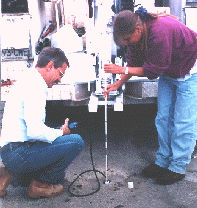 |
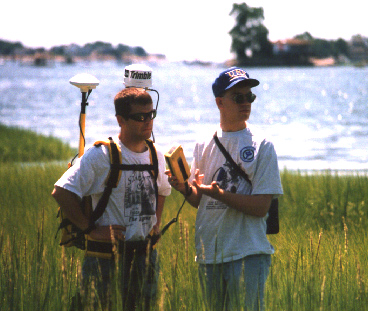 |
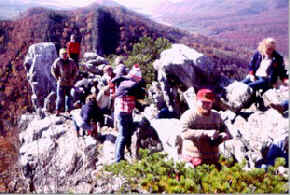 |
The university offers outstanding
undergraduate, graduate and post-graduate certificate programs in
environmental science. These include:
To learn more about these programs just
click on the one that interests you. This will lead you through
the
structure of each program, courses offered and schedules,
faculty, students enrolled in the program, special
activities and opportunities associated with each environmental
science program, addresses and phone numbers
to get more information, along with links to related areas on the
web. If you like what you see and would like to
apply to one of our programs please contact our admissions office so that they can send you an application
package. Have fun browsing and thank you for visiting.
Coordinator:
Roman N. Zajac, Associate
Professor of Biology and Environmental
Science, Ph.D., University of Connecticut
The purpose of this program is to provide graduate-level education for careers in environmental science as well as for other areas requiring knowledge of environmental principles. It is intended to meet the needs of those who wish to enter this dynamic and expanding field, those who are active environmental scientists and managers, and also those students who plan to pursue graduate training beyond the master's level. An interdisciplinary program comprised of courses in ecology, geology, chemistry and legislation, it provides the advanced skills and knowledge necessary to meet the increasing demand for scientists with an environmental background. Field and laboratory work provide practical experience for students enrolled in the program, while ongoing faculty projects provide opportunities to perform research on various environmental problems and issues. Scientists knowledgeable in environmental issues and science are needed by employers in these major areas:
There are a number of concentrations available in the Department:
More Information on Environmental Science Department
Concentration Adviser: Roman
N. Zajac,
Associate Professor of Biology and
Environmental Science, Ph.D., University of Connecticut
EN 602
Environmental Effects of Pollutants
EN 606
Environmental Data Analysis
EN 607
Environmental Reports and Impact Assessment
EN 615
Toxicology
Restricted Electives (two courses, from two other concentrations)
Plus three of the following:**
EN 603
Terrestrial and Wetland Ecology
EN 604
Ecology of Inland Waters
EN 605
Marine and Estuarine Ecology
EN 608
Landscape Ecology
EN 621
Hydrology (4 credits)
EN 650
Environmental Microbiology
EN 670
Selected Topics
Total credits: 27-28
Concentration Adviser: R. Laurence Davis, Professor of Earth and Environmental Science, Ph.D., University of Rochester
EN 621
Hydrology (4 credits)
EN 622
Groundwater Geology (4 credits)
EN 632
Field Geology of the Northeast (4 credits), or EN 633
Selected Field
Experiences in Geology (1-4 credits)
Restricted Electives (two courses, from two other concentrations)
Plus four of the following:**
EN 617
Subsurface Assessment
EN 620
Advanced Environmental Geology (4 credits)
EN 625
Geomorphology (4 credits)
EN 626
Glacial Geology
EN 627
Soil Science
EN 670
Selected Topics
Total credits: 28-30
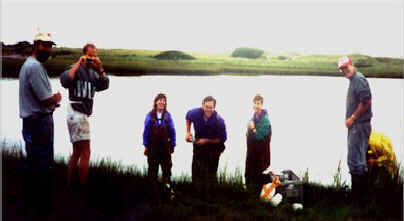 Environmental
Health and Management
Environmental
Health and Management
Concentration Adviser. Roman N. Zajac, Associate Professor of Biology and
Environmental Science, Ph.D., University of Connecticut
EN 607
Environmental Reports and Impact Assessment
EN 615
Toxicology
EN 617
Subsurface Assessment
EN 618
Hazardous Materials Management
Restricted Electives (two courses, from two other concentrations)
Plus three of the following:**
CE 605
Solid Waste Management
EN 602
Environmental Effects of Pollutants
EN 610
Environmental Health
EN 612
Epidemiology
EN 613
Radioactivity and Radiation in the Environment
EN 616
Human Health and Environmental Risk Assessment
EN 670
Selected Topics
SH 608
Industrial Hygiene Practices
SH 620
Occupational Safety and Health Law
Total credits: 27
**Other courses may be substituted with the approval of the concentration adviser/program coordinator. Courses in environmental engineering, chemistry, occupational safety and health, and/or computer science may also be approved as electives.
Geographical Information Systems (GIS) and Application
Concentration Adviser: Daniel
DePodesta,
Practitioner-in-Residence
EN 640 Introduction to Geographical
Information Systems
EN 641 Geographical Information System
Techniques and Applications I
EN 642 Geographical Information System
Techniques and Applications II
EN 643 Application of GIS in Environmental
Science
Restricted Electives
(two courses, from two other concentrations)
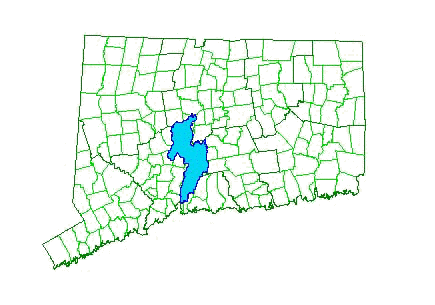
Plus three of
the following:**
EN 608 Landscape Ecology
EN 620 Advanced Environmental Geology
(4 credits)
EN 625 Geomorphology (4 credits)
EN 670 Selected Topics
Total credits:
27-29
See also the certificate in geographical information
systems.
**Other courses may be substituted with the approval of the
concentration adviser/program coordinator. Courses in
environmental engineering, chemistry, occupational safety and
health, and/or computer science may also be approved as
electives.
Certificate Program in Geographical Information Systems
Adviser: Daniel DePodesta, Practitioner-in-Residence
The
certificate in geographical information systems (GIS) provides
professional training in the technology and application of
computerized cartography and spatially referenced databases. GIS
is an increasingly important technology in environmental
sciences, urban and regional planning and management, marketing,
criminal justice, communications, and energy and natural resource
protection. Coursework provides knowledge in basic and advanced
GIS techniques, developing procedures and databases for specific
applications, as well as technologies and analyses supporting
GIS. The program is flexible in order to accommodate both
students new to GIS and those who already have some experience
with this technology. Students entering this program are required
to have a working knowledge of personal computers.
EN 640 Introduction to Geographical Information
Systems
EN 641 Geographical Information System Techniques
and Applications I
EN 642 Geographical Information System Techniques
and Applications II
EN 643 Application of GIS in Environmental
Science, or EN 690 Research Project
Total
credits: 12
Students
having previous GIS experience may substitute, with the adviser's
approval,other courses for EN 640 and/or EN 641. Suggested
substitutions, depending on a student's area of interest, may
include, but are not limited to, the following:
CJ 612 Criminal Justice Management
EN 600 Environmental Geoscience
EN 608 Landscape Ecology
EN 620 Advanced Environmental Geology (4 credits)
EN 690 Research Project
EN 695 Independent Study I
MK 641 Marketing Management
PA 660 Urban Planning: Theory and Practice
There are a number of pages on this site which provide information about our program. Just click on the one you want:
Environmental science is a diverse field with with strong interactions and interdependence among several scientific (e.g. biology, geology, and chemistry), technical (engineering, computer science) and social (law and legislation, ethics, business) disciplines. Persons with environmental science degrees are employed by industry, educational institutions, government agencies, consulting firms, conservation and advocacy groups, law firms, and insurance companies. Specific examples of the wide array of potential positions can be obtained by pursuing publications such as the World Environmental Directory, environmental job postings on the World Wide Web and in your local newspaper. Although job opportunities in the environmental field fluctuate with a number of factors, most notably the economy, the job market for those holding degrees in environmental science should increase as sound environmental practices, regulatory checks and balances become a regular feature of our society.
The M.S. Environmental Science Program at UNH provides opportunities for students with degrees in science to obtain a Masters Degree. This program is designed to accommodate both full-time students and working students who wish to continue their training on a part-time basis. Most of our courses are taught in the evening, meet once a week and are scheduled on a trimester calendar which begins in early September and ends in late June. For full-time students this provides the opportunity of having much of the day free to work on independent projects, thesis research, teaching or research assistantships, etc. Full-time students can finish the program in 1.5 to 2 years; part-time students in 3 to 5 years. The varied backgrounds of our students provide a stimulating environment for learning and exchanging professional insights and experiences. Research and teaching assistantships are available to full-time students, and if you plan to submit an application, please contact the program coordinator, other faculty or the Graduate School office at UNH directly with regards to opportunities in this area.
Students select a program that focuses on one of several concentrations areas (Environmental Ecology, Environmental Geology, Environmental Health and Management, Geographic Information Systems) or they can design a personalized program of study in consultation with the program coordinator. Concentrations and personal programs are built on a set of core courses in Ecology, Environmental Geology, Environmental Chemistry and Environmental Law and Legislation. The program also requires a research project or a thesis. A thesis is recommended if one plans to pursue graduate work at the Ph.D. level. The courses in each concentration provide the opportunity for in-depth study of the various subdisciplines of environmental science.
In addition to environmental science course offerings, students can select related courses in other departments at UNH including Civil and Environmental Engineering (such as water and waste treatment, solid waste management, geotechnical engineering), Chemistry and Chemical Engineering (such as environmental chemical analysis, air pollution chemistry) and Occupational Health and Safety (such as industrial hygiene, product safety and liability, control of occupational health hazards). The faculty in these departments are accessible to our students and frequently supervise research projects and theses.
Our students are actively involved in all of these research areas. In addition they are currently collaborating with faculty on developing Geographic Information Systems for the Quinnipiac River Basin for the New Haven Foundation and of the Connecticut River Estuary for the Nature Conservancy, and related environmental analyses (e.g. nonpoint pollution assessment). Other students are developing an evaluation of the geology and hydrogeology of the Mashantucket Pequot Indian Reservation for the Pequot Tribal Council.
If any of this research is of interest to you, please contact Roman Zajac for more details. Any research assistantships offered will generally be in the areas of interest of our primary faculty, but graduate students are free to pursue other research topics, and many do. Frequently, such topics are related to work that the student is currently doing in his or her professional position.
The department has a wide variety of field and laboratory equipment. In addition to the standard samplers, transits, current meters, etc., we also have a l6 foot Boston Whaler for teaching and conducting research in aquatic habitats, a fully equipped Geographic Information System laboratory, and a Scanning Electron Microscope. We also have Global Positioning System (G.P.S.) equipment.
Norman Richards
Sandra Selenskas
Robert Wardwell
Mike Ziskin